| Srl | Item |
| 1 |
ID:
080192
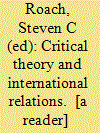

|
|
|
|
|
| Publication |
London, Routledge, 2008.
|
| Description |
xxv, 398p.
|
| Standard Number |
9780415954181
|
|
|
|
|
|
|
|
|
|
|
|
Copies: C:1/I:0,R:0,Q:0
Circulation
| Accession# | Call# | Current Location | Status | Policy | Location |
| 052996 | 327.101/ROA 052996 | Main | On Shelf | General | |
|
|
|
|
| 2 |
ID:
097418
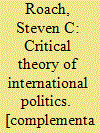

|
|
|
|
|
| Publication |
Oxon, Routledge, 2010.
|
| Description |
viii, 171p.
|
| Standard Number |
9780415774857
|
|
|
|
|
|
|
|
|
|
|
|
Copies: C:1/I:0,R:0,Q:0
Circulation
| Accession# | Call# | Current Location | Status | Policy | Location |
| 055039 | 327.101/ROA 055039 | Main | On Shelf | General | |
|
|
|
|
| 3 |
ID:
067821


|
|
|
| 4 |
ID:
125347
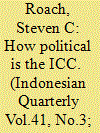

|
|
|
|
|
| Publication |
2013.
|
| Summary/Abstract |
The International Criminal Court faces many daunting political challenges in Kenya, Libya and Sudan. It has addressed these challenges and defended its impartiality in these situations by insisting that it remains an apolitical institution. This article challenges the conventional focus on the ICC`s apolitical nature by adopting an alternative approach that examines its political and pragmatic role in seeking mutual accommodation. It argues that the ICC can and should seek mutual accommodation rather than simply justice under the Rome Statute. In doing so, the article develops and applies the term diplomatic efficacy, or the political capacity of the ICC to produce acceptable solutions, by addressing the soft power dimension of such efficacy. The ICCS`s diplomatic efficacy not only reflects its special role as an independent court or agent in the interstate system, but also represents a practical and strategic to manage the political problems that its interventions and deferral to national authorities may create. The article concludes that the ICC`s political efficacy can help to resolve the incongruities between proactive complementarity and the provisions of cooperation encoded in the Rome Statute
|
|
|
|
|
|
|
|
|
|
|
|
|
|
|
|
| 5 |
ID:
066348


|
|
|
| 6 |
ID:
130408
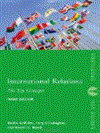

|
|
|
|
|
| Edition |
3rd ed.
|
| Publication |
Oxon, Routledge, 2014.
|
| Description |
xvii, 446p.Pbk
|
| Standard Number |
9780415844949
|
|
|
|
|
|
|
|
|
|
|
|
Copies: C:1/I:0,R:0,Q:0
Circulation
| Accession# | Call# | Current Location | Status | Policy | Location |
| 057728 | 327.03/GRI 057728 | Main | On Shelf | General | |
|
|
|
|
| 7 |
ID:
148466


|
|
|
|
|
| Summary/Abstract |
Since the warring parties to South Sudan's civil war (2013–15) signed a peace agreement in August 2015, South Sudan has endured a series of setbacks and clashes that have threatened the fragile peace process. This article examines many key factors affecting the peace process, including rampant corruption, military factionalism, gross human rights abuses and ineffective foreign intervention/pressure. It shows that the past and present failure to structure accountability at the institutional level drives the instability and distrust that has limited the political dialogue and consensus needed to implement the peace deal. To frame this issue of accountability, the article distinguishes between core (essential) and peripheral (self-serving) objectives of promoting accountability. In doing so, it seeks to devise and apply the logic of this dynamic of accountability and to explain the unexpected outcomes of South Sudan's conflict. It argues that, rather than transforming the conditions and hostile relations of South Sudan's situation, international demands for accountability continue to fuel the volatile tensions between international authorities and the various factions inside the Sudan People's Liberation Movement/Army (SPLM/A). The central conclusion the article draws is that instead of signifying the official beginning of the end of the conflict, the peace agreement has wedged itself between the core and peripheral objectives of accountability, thereby setting the stage for further stalemate and increasing distrust among domestic and international authorities.
|
|
|
|
|
|
|
|
|
|
|
|
|
|
|
|
| 8 |
ID:
070959
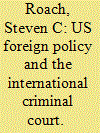

|
|
|
|
|
| Publication |
2006.
|
| Summary/Abstract |
The United States has argued that its military personnel can and should be exempt from ICC investigation and prosecution, and that the ICC Statute should be revised accordingly. Advocates of the ICC have condemned this position by claiming that it undermines the morale of the ICC and is based on false legal and political pretenses. This article proposes a third way of strategic accommodation involving amendments to the ICC Statute that will serve as structured incentives to the U.S. to (re) sign and ratify the ICC Treaty. Such an arrangement will avert the need for special measures that would violate the integrity of the ICC Statute and build consensus within the Assembly of States Parties.
|
|
|
|
|
|
|
|
|
|
|
|
|
|
|
|
| 9 |
ID:
145786


|
|
|
|
|
| Summary/Abstract |
Much of the scholarly attention on commitments in international relations (IR) has remained narrowly framed, focusing on how states and other actors make strictly strategic calculations to comply with international norms and/or treaties. The trouble with this rationalist approach is that it oversimplifies the moral basis of commitments. This article offers a deeper analysis of this moral basis as well as the positive ethical values that help to direct and shape the content of the moral commitments of agents in IR. The article argues that the ethical values of sincerity, empathy and sacrifice play a dynamic yet under-studied meta-level role in helping one to interpret and explain the transformative dimensions of moral commitments in IR. The article first develops a meta-level theoretical approach to commitment in international theory and then applies this approach to two particular emergent discourses in international politics: the responsibility to protect and moral criminal accountability.
|
|
|
|
|
|
|
|
|
|
|
|
|
|
|
|